Birmingham pub bombings: Who were the victims?
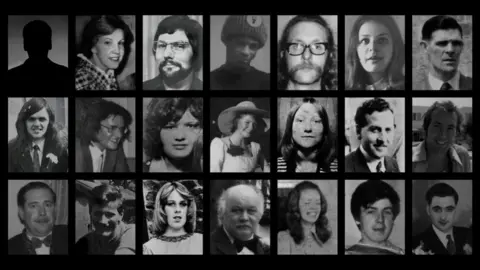 BBC
BBCOn 21 November 1974, two bombs ripped through the Mulberry Bush and Tavern in the Town pubs in Birmingham, killing 21 and injuring 220.
Some 44 years later, inquests into the deaths have concluded they were unlawfully killed.
Friends and family members have read out pen portraits for victims of the atrocity.
Here, in their own words, families and friends pay tribute to the 21.

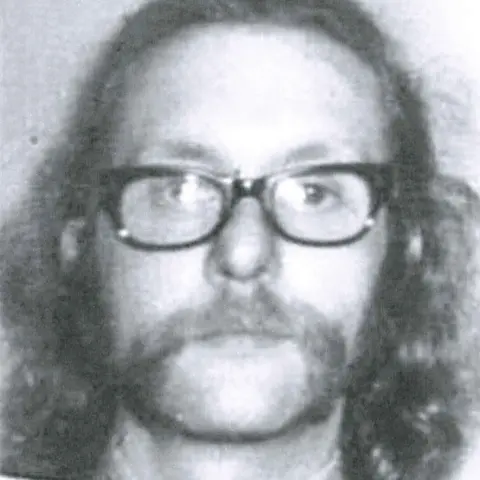 Birmingham Inquests
Birmingham InquestsMichael Beasley, John Rowlands, Stanley Bodman, John Clifford Jones and James Caddick
Michael Beasley, a regular at the Mulberry Bush, was with friends Stan Bodman, John Rowlands, Cliff Jones and James Caddick on the night of the bombings.
He loved everything about films and often visited the Odeon at New Street, Birmingham, said a solicitor who read out his pen portrait.
On the night of the bombings, the 30-year-old spoke to Mary Jones, wife of the pub's licensee.
"He told her he found a lucky pixie charm on the bus on the way to town that night and he gave the charm to her.
"Mary kept the charm and always carried it with her following that evening."
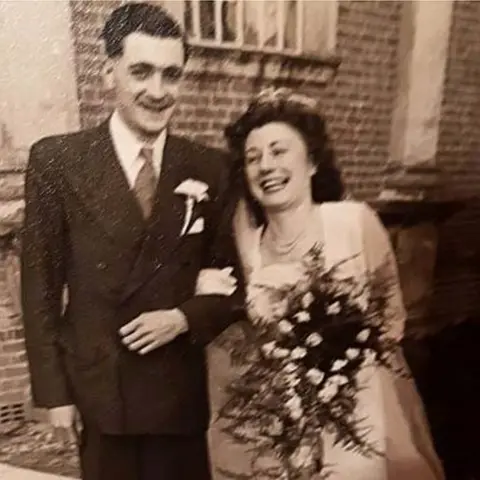 Birmingham Inquests
Birmingham InquestsFather-of-two John Rowlands had served in the Fleet Air Arm of the Royal Navy and later joined Land Rover in Tyseley, where he worked as an electrician and eventually became a foreman.
"To some he was a bit of a card, a joker, and a good bloke to go to the pub with," his son Paul said.
His other son Stephen, who himself joined the air force, said when he had been on leave he had always gone with his father to his "favourite pub", the Mulberry Bush.
Paul added: "I wish only he had lived long enough to see his grandchild and great grandchildren grow up."
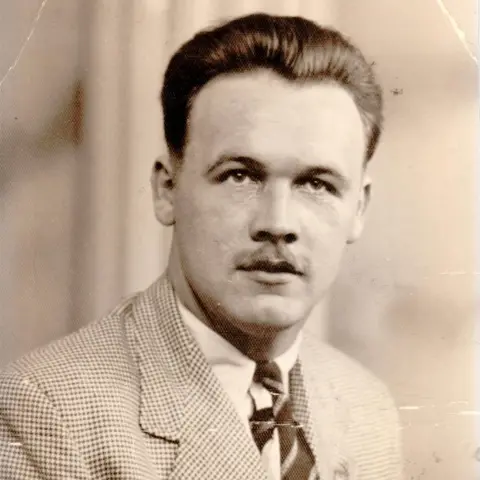 Birmingham Inquests
Birmingham InquestsStanley Bodman, 47, was an electrician working in the city centre at the time of the bombings.
Described as a "larger than life personality" by son Paul Bodman, he told the inquests his father had been ex-RAF and "fully aware of the devastation a bomb could do".
He said his father had a great love of sport, especially boxing and cricket, and spent time at Edgbaston watching Warwickshire.
"He was one of the funniest and kindest people anyone could ever wish to meet and he was taken away from his family far too soon," Mr Bodman said.
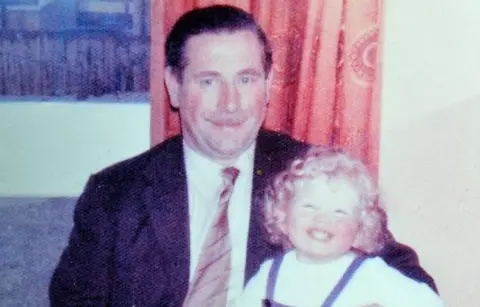 Birmingham Inquests
Birmingham InquestsJohn Clifford Jones, known to friends as Cliff, had been married to his wife Gladys for 30 years and had four children, his son George Jones told the inquests.
He worked as a postman at New Street station, though his main interest was gardening.
His son said his father had served in France and Belgium during World War Two, enlisting at the age of 18.
The serviceman suffered wounds to his abdomen, elbow and thigh when caught up in burst of machine gun fire nearing the end of hostilities in 1945.
His parents were in his 70s when he was killed and survived him by eight years.
They never came to terms with their loss and the "cruel and barbaric way" he died, Mr Jones said.
"He was a modest, unassuming man that took interest in all that was going on around him. He had a strong sense of right and wrong."
In 1973 he helped put out a blaze in the Rotunda building, receiving a letter of thanks from the chief fire officer.
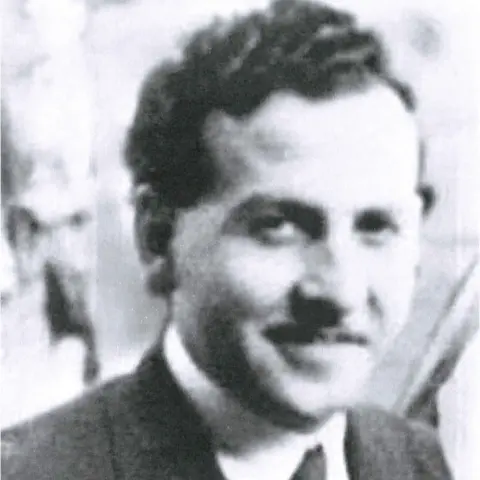 Birmingham Inquests
Birmingham InquestsMarket porter James Caddick worked at St Martin's Market in Birmingham.
He had previously been married and had two daughters.
Shortly before the bombings he met Nora Caddick, who became his partner.
They intended to marry and lived together in Aston with Nora's son John, the inquests were told.

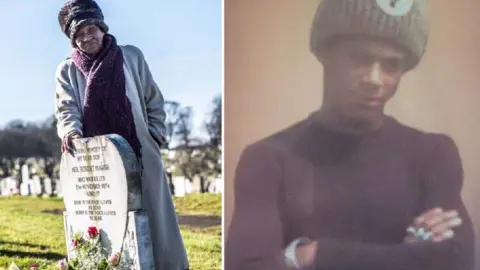 Birmingham Pub Bombings Inquests 1974
Birmingham Pub Bombings Inquests 1974Neil Marsh and Paul Davies
Youngest victim Neil Marsh was just days away from his 17th birthday when he was killed alongside his friend Paul Davies, 17.
Neil's cousin Danielle Fairweather-Tipping told the hearings he had been given the pet name 'Tommy' by his grandparents who raised him in Jamaica before he rejoined his mother in England in 1967, aged 10.
Though there is no photograph of him, the court was shown a picture of his mother at his grave taken on 14 February.
Ms Fairweather-Tipping said Neil's brother Gary had been six at the time of his death but remembered him being "caring and very kind, and that he loved to draw".
Paul's daughter Michelle Sealey and son Paul Anthony Bridgewater said their reggae-loving father would "never be forgotten".
Ms Sealey, who was six months old when he died, said: "I never tire of hearing stories about him. He was loved by the ladies and was quite charming I was told."
A "massive Bruce Lee fan" who would practise his moves at home, Paul also supported Aston Villa, a passion shared by his son, the inquests heard.
Ms Sealey added: "After hearing stories about him, I remember I would daydream about him being around and what kind of relationship we would have had."

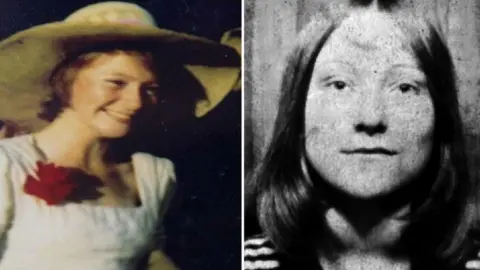 Birmingham Pub Bombings Inquests 1974
Birmingham Pub Bombings Inquests 1974Maxine Hambleton and Jane Davis
Maxine Hambleton was 18 when she was killed in the Tavern in the Town with her friend Jane Davis.
She had been in the pub to meet friends and hand out invitations to a housewarming party.
Her brother Brian spoke of giving her a lift into the city that night and of since feeling he had "literally driven my sister to her death".
Her youngest sister Julie told the hearings Miss Hambleton, who worked at the Miss Selfridge outlet in Lewis's, would have been the first in the family to go to university but had died without ever knowing she had won a place.
Julie Hambleton added: "She was born to set the world on fire, no matter what she did or where she went."
Jane Davis had just returned from grape picking in the Champagne region of France with Miss Hambleton and had been due to share photos of their trip that night, her brother Brian Davis said.
"We will not be able to hear Jane's voice, but we do still have her words in the postcards," he added.
Mr Davis said the 17-year-old had had aspirations to become a nuclear physicist, adding: "I remember Jane as a loving, loyal and accomplished young woman with the world at her feet."

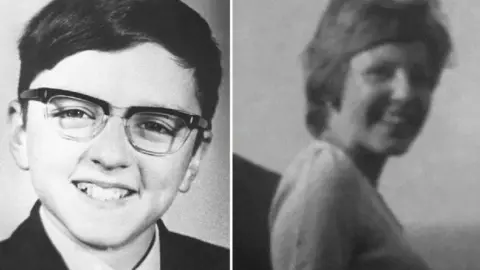 Birmingham Pub Bombings Inquests 1974
Birmingham Pub Bombings Inquests 1974Stephen Whalley and Lynn Bennett
Stephen Whalley was with his girlfriend Lynn Bennett on the night they died in the Tavern in the Town. They met through the NME's lonely hearts pages.
Miss Bennett, a punchcard operator, was "very petite and looked great in miniskirts and platforms", her sister Claire Luckman said.
Her passion was Birmingham City Football Club but, after the bombings, her father "never stepped foot in the ground again, such was the pain of losing Lynn".
A statement read on behalf of Mr Whalley's elderly mother, who was too frail to attend, said: "While I would love the world to know about my son Stephen and the lovely young man he was, it is just too difficult and painful for me to recall any memories I have because it is too traumatic to remember.
"Stephen was our only child who had his whole life ahead of him."

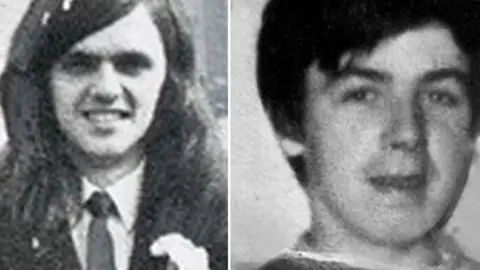 Birmingham Pub Bombings Inquests 1974
Birmingham Pub Bombings Inquests 1974Desmond and Eugene Reilly
Brothers Desmond and Eugene Reilly were in the Tavern in the Town.
Their older brother Sean, 26 at the time of their deaths, said his sister Mary, then 17, had seen Desmond on the afternoon of 21 November looking for Eugene to celebrate.
"Mary said Desmond was in great spirits, he was delighted that his wife Elaine was pregnant," he said.
"Desmond just invited her to join them for a drink but she had just finished work and said that her mother was expecting them home for dinner."

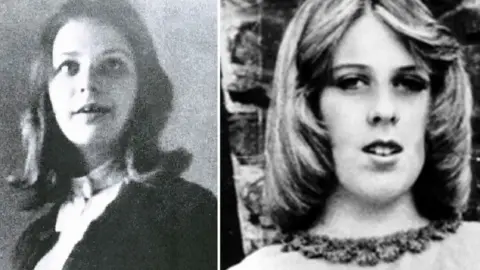 Birmingham Pub Bombings Inquests 1974
Birmingham Pub Bombings Inquests 1974Marilyn Nash and Anne Hayes
Friends Marilyn Nash, 22, and Anne Hayes, 19, were in the Tavern in the Town when they died.
Miss Nash left school at 16 and was working as a supervisor at Miss Selfridge in Lewis's department store. She often went to the pub for a drink after work with Miss Hayes.
Miss Hayes, from Sutton Coldfield, was a shop assistant at Miss Selfridge after leaving school to become an apprentice hairdresser.

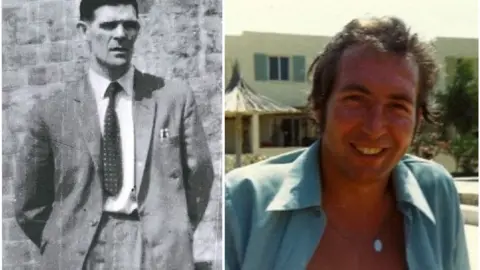 Birmingham Pub Bombings Inquests 1974
Birmingham Pub Bombings Inquests 1974Charles Gray and Thomas Chaytor
On the night of the bombings, Charles Gray visited the Mulberry Bush for the first time.
The solicitor to the inquest said the 44-year-old, who was born in Scotland and moved to Birmingham after completing National Service, had previously worked at toffee-making factory Fillerys.
In 1974 he worked in Longbridge as a mechanic with car manufacturer British Leyland and had never missed a day's work, the inquests heard.
Described by his family as a "lovely, quiet man", he was a private person and was "always known for being well dressed".
Thomas Chaytor, meanwhile, had been working part-time at the Tavern in the Town for just a few weeks before the attack.
He had been adopted as a child and was a divorcee with two young children.
Mr Chaytor met his girlfriend Susan Hands in 1971 when they were working at Rackhams department store in the city centre.
She described him as a "very social character, living life to the full".
Ms Hands said: "After the events in 1974, as a 23-year-old, I had to rebuild my life.
"I have no idea how things would have turned out had the bombings not occurred."

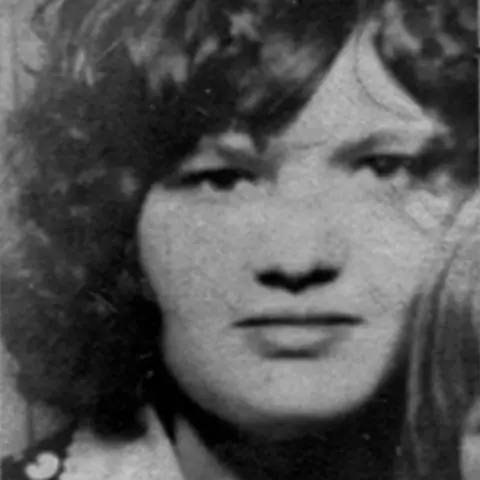 Birmingham Inquests
Birmingham InquestsPamela Palmer, Maureen Roberts, Trevor Thrupp and James Craig
Pamela Palmer worked in an office but was in further education and being taught to drive by her sister Pauline Curzon's husband when she lost her life in the attack.
Ms Curzon described her as a "lovely sister".
"That Thursday evening she was going for a drink with her boyfriend, we didn't know the destination," Ms Curzon said.
She said her father had called at about 11 o'clock concerned she had not returned and went to town to look for her, returning at six the next morning with the news.
"Her companionship and kindness is a memory I treasure," added Ms Curzon
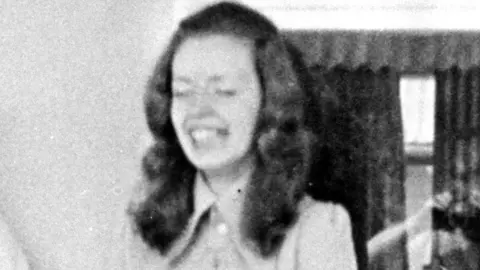 Birmingham Inquests
Birmingham InquestsMaureen Roberts was 20 years old when she died, an only child of Ivy and Douglas.
She intended to marry Fred Bromley and was described as "a happy go lucky girl with many friends and a great sense of humour".
The hearings were told she had "striking auburn hair, the colour of gold", and always put other people first.
"She brought her neighbours presents every Christmas and would take time to visit neighbours who lived nearby," the jury heard.
Shortly before her death she had returned from a holiday in Spain.
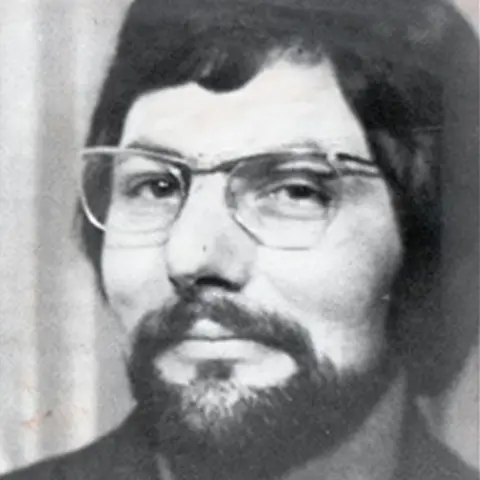 Birmingham Inquests
Birmingham InquestsFather-of-three Trevor Thrupp, who worked as a railway guard, had an "infectious" laugh and had been the "life and soul of the party", his son Paul said.
The dedicated family man, who was married to Lilian, also enjoyed fishing.
"We spent many weekends as a family joining him on trips around the area," his son said.
"Our special memory is trips to Stourport where we would all pile on the bus to spend the day with dad, fishing on the River Severn."
Mr Thrupp said his father's laugh had been infectious, adding: "We remember him crying and falling off the sofa when watching Laurel and Hardy.
"We keep his memory alive by telling our children what a great hard working man he was."
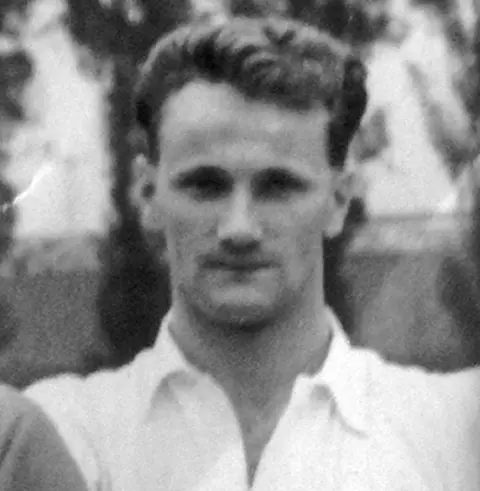 Birmingham Inquests
Birmingham InquestsJames Craig, known as Jimmy, was a motor factory worker whose family was originally from Northern Ireland.
"His only interest was playing football," his brother Bill Craig said.
"Sometimes he would play twice on a Sunday: Go out Sunday morning, come home, have his dinner, go out Sunday afternoon and play for somebody else."
A triallist for Birmingham City in the 1960s, he could neither read nor write.
His brother said he was the last one to die as a result of the pub bombings, passing away on the afternoon of 9 December 1974.
Amendment 14 March 2019: This story has been updated to reflect the most recent information that 220 people were injured in the blasts.
